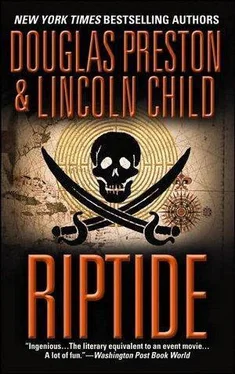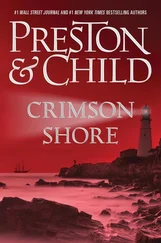Douglas Preston - Riptide
Здесь есть возможность читать онлайн «Douglas Preston - Riptide» весь текст электронной книги совершенно бесплатно (целиком полную версию без сокращений). В некоторых случаях можно слушать аудио, скачать через торрент в формате fb2 и присутствует краткое содержание. Жанр: Триллер, на английском языке. Описание произведения, (предисловие) а так же отзывы посетителей доступны на портале библиотеки ЛибКат.
- Название:Riptide
- Автор:
- Жанр:
- Год:неизвестен
- ISBN:нет данных
- Рейтинг книги:3 / 5. Голосов: 1
-
Избранное:Добавить в избранное
- Отзывы:
-
Ваша оценка:
- 60
- 1
- 2
- 3
- 4
- 5
Riptide: краткое содержание, описание и аннотация
Предлагаем к чтению аннотацию, описание, краткое содержание или предисловие (зависит от того, что написал сам автор книги «Riptide»). Если вы не нашли необходимую информацию о книге — напишите в комментариях, мы постараемся отыскать её.
Riptide — читать онлайн бесплатно полную книгу (весь текст) целиком
Ниже представлен текст книги, разбитый по страницам. Система сохранения места последней прочитанной страницы, позволяет с удобством читать онлайн бесплатно книгу «Riptide», без необходимости каждый раз заново искать на чём Вы остановились. Поставьте закладку, и сможете в любой момент перейти на страницу, на которой закончили чтение.
Интервал:
Закладка:
The Captain disappeared down the ladder. Hatch waited, his mind empty of everything but the chill breath from the well before him. Silently, Bonterre took his hand in hers.
A few minutes later, Neidelman called up. Hatch stepped forward, bent down, and gripped the rails of the narrow ladder.
The well was only four feet in diameter. Hatch climbed down, following the smooth-walled shaft as it curved around a large rock. He stepped off the bottom rung, sank his foot into foul-smelling ooze, and looked around, almost drowning in dread.
He was in a small chamber, cut into the hard glacial till. It had the look of a cramped dungeon, massive rock walls on all sides. But then he noticed that one of the walls did not reach the floor. In fact, what he thought was a wall was a massive piece of dressed stone, hewn square.
Neidelman angled his light beneath the stone. There was a dim flash of white.
The pulse pounding at his temples, Hatch took a step forward, then bent down. He unhooked his flashlight from the harness and snapped it on.
Jammed beneath the stone was a skeleton. The Red Sox cap still hung on the skull, clumps of brown hair peeking out from beneath. A rotten shirt clung to the rib cage. Below was a pair of ragged dungaree shorts, still attached by a belt. One bony knee peered out from the denim. A red, high-top Keds sneaker covered the right foot, while the left was still trapped behind the rear of the stone, ground into a rubbery mass.
The distant part of Hatch could see that the legs and arms were massively fractured, the ribs sprung from the breastplate, the skull crushed. Johnny—for this could only be Johnny—had fallen victim to one of Macallan's traps, similar to that which killed Wopner. But without the helmet to slow the movement of the rock, death had been much quicker. At least, Hatch could always hope so.
He reached out, gently touching the brim of the cap. It was Johnny's favorite, signed by Jim Lonborg. Their father had bought it for him on that trip down to Boston, the day the Red Sox won the pennant. His fingers moved down to caress a lock of hair, then traced the curve of the mandible, past the chin to the crushed rib cage, along the arm bones to the skeletonized hand. He noticed every detail as if in a dream: distant, yet with that peculiar intensification that sometimes occurs in dream, every detail etched into his brain with jewellike clarity.
Hatch remained motionless, cradling the cold, birdlike bones in his own hand, in the sepulchral silence of the hole.
Chapter 38
Hatch swung the Plain Jane's dinghy past Cranberry Neck and into the broad, slow reach of the Passabec River. He glanced over his shoulder as he angled the boat closer to shore: Burnt Head lay three miles behind, a reddish-colored smudge against the southern horizon. The late summer morning air held a chill that was pregnant with the promise of winter.
He kept the little engine running hard, concentrating on thinking about nothing.
As the river narrowed and became less tidal, the water grew calm and green. Now he was passing what as a boy he'd called Millionaire's Row: a series of grand nineteenth-century "cottages" adorned with turrets, gables, and mansard roofs. A small child, dressed in the fantastically anachronistic outfit of pinafore and yellow umbrella, waved to him from a porch swing as he went by.
Inland, the landscape softened. Rocky shores gave way to low pebbled beaches, and spruce trees were replaced by mossy oaks and stands of birches. He passed a ruined pier, then a fishing shack on stilts. Not much farther now. Around another bend, and there it was: the shingle beach he remembered so well, its massive, improbable banks of oyster shells heaped twenty feet high. It was deserted, as he knew it would be. Most local residents of Stormhaven and Black Harbor had little interest in prehistoric Indian encampments, or the shell heaps they'd left behind. Most, but not all: this was the place Professor Horn had taken him and his brother one warm cloudless afternoon, the day before Johnny died.
Hatch pulled the dinghy up onto the beach, then retrieved his battered paintbox and collapsible chair from the bow. He looked around a moment, deciding on a spot beneath a lone birch tree. It was out of the glare of the sun, and his paints wouldn't dry up in the heat. He placed the paintbox and chair in the shade of the tree, then went back to the dinghy for the fold-up easel and portfolio.
As he set up, he found himself looking around, choosing theme and viewpoint, arranging landscape elements. Sitting down, he gazed out at the scene through a viewing frame, squinting to better understand the distribution of color and mass. The light gray of the shell heaps in the foreground made a perfect contrast to the distant purple bulk of Mount Lovell. No need for a quick pencil sketch here; he could go straight to the watercolor.
Opening the portfolio, he carefully removed a large sheet of 240-pound, cold-pressed paper. He taped it to the easel, then ran his fingertips appreciatively over the pure linen rag. An expensive indulgence, but worth every penny: the paper had a tooth that would hold the paint and make detail work easier, even with the kind of wet-on-wet style he favored.
He unrolled the cardboard from around each of the brushes, then examined his selection: a square-end, a couple of sable rounds, a goat-hair mop, and an old quarter-inch flat for dry-brushing clouds into the background. Next, he half-filled a palette well with water. Reaching into the paintbox and removing a tube of cerulean blue, he squeezed the paint into the well and stirred, momentarily annoyed that his injured hand wasn't healing as quickly as it should. He dampened the paper with a cotton ball, then glanced out at the landscape for a long moment. Finally, fetching a deep breath, he dipped a brush in the well and laid a flat blue wash over the top two-thirds of the sheet.
As the brush ran along the paper in thick, broad strokes, Hatch felt something coiled tight within him begin to come loose. It was healing work, painting this landscape; cleansing work. And it felt right, somehow, returning to this place. In the years after Johnny's death, he'd never been able to come back to the Indian shell heaps. And yet, returning to Stormhaven a quarter century later—and especially now, after the discovery of his brother's body—Hatch sensed himself turning a corner. There was pain, but there was also an end to pain. His brother's bones had been found. Perhaps—if he could decide on a fitting memorial—they would be removed from the earth where they had lain for so long. Perhaps there would also be time to understand the fiendish mechanism that caused his death. But even that was less important now. He could close the chapter and move on.
He returned to the painting. Time to lay down a foreground. The stony pebbles of the beach were an almost perfect match for his yellow ochre. And he could mix the ochre with the tube of Payne's gray to catch the color of the shell heaps.
As he reached for another brush, he heard the sound of an inboard coming upriver. Looking up, he saw a familiar figure scanning the riverbanks, the tanned skin dark under a large-brimmed straw hat. Bonterre caught sight of him, smiled and waved, then nosed the Thalassa launch gently toward the shore and killed the motor.
"Isobel!" he said.
She anchored the boat on the beach, then came toward him, removing the hat and shaking her long hair back. "I have been spying on you from the post office. They have a nice old telescope there. I watched you take your little boat into this river, and I got curious."
So that's how she's going to play it, he thought: business as usual, no dewy-eyed empathy, no treacly references to what happened the day before. He felt vastly relieved.
Читать дальшеИнтервал:
Закладка:
Похожие книги на «Riptide»
Представляем Вашему вниманию похожие книги на «Riptide» списком для выбора. Мы отобрали схожую по названию и смыслу литературу в надежде предоставить читателям больше вариантов отыскать новые, интересные, ещё непрочитанные произведения.
Обсуждение, отзывы о книге «Riptide» и просто собственные мнения читателей. Оставьте ваши комментарии, напишите, что Вы думаете о произведении, его смысле или главных героях. Укажите что конкретно понравилось, а что нет, и почему Вы так считаете.












